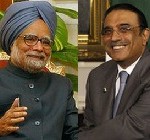The three-day visit to Pakistan by India’s External Affairs Minister S. M. Krishna, which concluded on 9 September 2012, was clearly meant to prepare the ground for Prime Minister Manmohan Singh’s proposed visit to that country, later this year.
The last Indian Prime Minister to visit Pakistan was A. B. Vajpayee, in February 1999, when he travelled by bus to Lahore and signed the Lahore Declaration, and in January 2004 for the SAARC Summit. In 1999, everybody thought that the two neighbours were opening a new chapter in bilateral relations. In less than three months, Pakistan started the Kargil War.
A visit to Pakistan by an Indian Prime Minister after more than eight years, and after the 26 November 2008 attacks in Mumbai, will be significant – should it take place. The tenure of the Indian High Commissioner in Pakistan has been extended till February 2013, indicating that the visit is being seriously planned.
However, the joint press statement issued at the conclusion of Krishna’s visit did not announce the PM’s visit. The statement, the timing and the agenda of the PM’s visit, all raise a few questions.
Paragraph four of the joint statement says that the Ministers “expressed satisfaction on the holding of meetings on the issue[s] of Counter-Terrorism (including progress on Mumbai trial)…” Does this mean that India is “satisfied” with the progress made in the “Mumbai trial”? What does “Mumbai trial” mean? The trial of Ajmal Kasab in Mumbai, or the judicial process in Pakistan, to bring to justice those responsible for 26/11? What else was discussed under “counter-terrorism”? The joint statement does not spell this out.
What does India want Pakistan to do before it announces the PM’s visit? Evidently, India wants real, not cosmetic, progress in the ongoing judicial process in Pakistan with regard to 26/11. Paragraph 10 of the statement says: “The Ministers noted the commitment given by Pakistan during the Interior/ Home Secretary talks in May 2012 to bring all the perpetrators of the Mumbai terror attacks to justice expeditiously in accordance with due process of law.” Pakistan made such a commitment earlier too. By dating the commitment to May 2012, Pakistan could be gaining more time to take action.
Pakistan’s Foreign Minister Hina Rabbani Khar has counselled India to look at 26/11 “unemotionally.” This indicates that her government is unlikely to accelerate the 26/ 11 judicial process. She has reminded India that it too is slow in convicting those responsible for the Samjhauta Express blasts in February 2007, which killed 68, including a number of Pakistani nationals. Pakistan has again complained that it has not been briefed on the investigations into the Samjhauta blasts. It is difficult to understand why India cannot brief Pakistan on this matter; it also need not insist that the findings will be shared only when the investigation is completed.
What does Pakistan hope to get from a visit by Manmohan Singh? Pakistan wants India to withdraw from Siachen. The Indian military’s presence in Siachen makes it difficult for Pakistani troops to cross the Line of Control, so there is no case to withdraw Indian troops from Siachen. It follows that this should not be a matter for discussion. But Pakistan has managed to get this included in the agenda.
As things stand, it is possible to work out a deal on Sir Creek, giving Pakistan advantage without India’s losing much strategically. India is hoping that Pakistan will agree to the Sir Creek settlement as a concrete outcome of the PM’s visit. Pakistan is insisting it also wants a settlement on Siachen.
For years, India adopted a step-by-step approach: if Kashmir is difficult to resolve, let us agree on other things, to create a favourable climate to help resolve the more difficult issue. Pakistan opposed that approach, insisting that without resolving the Kashmir issue, serious progress was not possible. Now, Pakistan seems to be saying let there be step-by-step progress even if there is no progress on Kashmir or 26/11. In other words, Pakistan is not prepared to act on the 26/11 issue, but as a first step it wants India to vacate Siachen.
There is no merit in rushing to a summit. The temptation to seek a breakthrough should be resisted till the objective conditions that permit it are in place – and there is no indication of change in Pakistan’s basic attitude.
The timing of the proposed visit is also questionable. The Pakistan National Assembly will be dissolved on or before 18 February 2013, and a general election is due in March/ April 2013. By December 2012, Pakistan will get into election mode. President Zardari will appoint a provisional government if the governing party and the Opposition can agree on a head of government. Otherwise, the Chief Election Commissioner will appoint a Prime Minister.
If Manmohan Singh visits Pakistan in November 2012 and signs agreements, his interlocutors might not be in office just weeks later. Pakistan has told S. M. Krishna that a caretaker government might have to be appointed only by the middle of February 2013. The present government will be in office till then.
This may not be good enough. So why rush through with a visit? Good diplomacy and haste seldom go together.
Ambassador K. P. Fabian served in the Indian Foreign Service between 1964 and 2000, and is currently the President of AFPRO (Action For Food Production) and IGSSS (Indo-Global Social Service Society).
This article was exclusively written for Gateway House: Indian Council on Global Relations. You can read more exclusive content here.
For interview requests with the author, or for permission to republish, please contact outreach@gatewayhouse.in.
© Copyright 2012 Gateway House: Indian Council on Global Relations. All rights reserved. Any unauthorized copying or reproduction is strictly prohibited.


